Telos 173 (Winter 2015) is now available for purchase in our store.
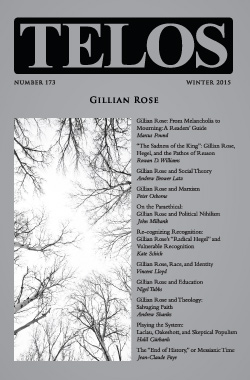 Gillian Rose (1947–1995) had an influence in excess of her literary output and treatment in secondary literature. Author of eight books, two articles, and four book reviews, she also had important, though perhaps hidden, effects on the UK academic scene through academic friendship, doctoral supervision, and interdisciplinary work. She inspired many students and colleagues, even where she does not appear in bibliographies or citations. She made major contributions to introducing the Frankfurt School to the UK; aided the Hegel renaissance in English-language scholarship; and was an early critic of post-structuralism and political theology. Several of the papers gathered here were first given at a conference at Durham University on January 9, 2015, to mark the twentieth year since Rose’s death. That conference and this special issue of Telos are premised on the view that Rose’s work still has much philosophical insight and inspiration to offer. The authors of these papers were students, colleagues, and/or friends of Rose, or studied her work as part of their doctoral research. The diversity of their fields reflects some of the range and interdisciplinarity of Rose’s own work: Hegel, social theory, Marxism, politics, race, recognition theory, education, and theology. We hope that this issue provokes a renewed interest in what Rose can still offer us today. Gillian Rose (1947–1995) had an influence in excess of her literary output and treatment in secondary literature. Author of eight books, two articles, and four book reviews, she also had important, though perhaps hidden, effects on the UK academic scene through academic friendship, doctoral supervision, and interdisciplinary work. She inspired many students and colleagues, even where she does not appear in bibliographies or citations. She made major contributions to introducing the Frankfurt School to the UK; aided the Hegel renaissance in English-language scholarship; and was an early critic of post-structuralism and political theology. Several of the papers gathered here were first given at a conference at Durham University on January 9, 2015, to mark the twentieth year since Rose’s death. That conference and this special issue of Telos are premised on the view that Rose’s work still has much philosophical insight and inspiration to offer. The authors of these papers were students, colleagues, and/or friends of Rose, or studied her work as part of their doctoral research. The diversity of their fields reflects some of the range and interdisciplinarity of Rose’s own work: Hegel, social theory, Marxism, politics, race, recognition theory, education, and theology. We hope that this issue provokes a renewed interest in what Rose can still offer us today.
Continue reading →
By Jay A. Gupta · Monday, March 30, 2015 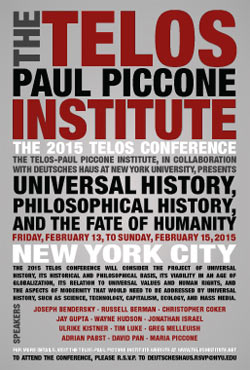 Hegel’s lectures on the philosophy of history chart the development of free, reflective self-conscious selves, but what exactly does that mean? For skeptics, it doesn’t mean much, as Hegel notoriously appears to ground this development in the development of the state. This has inspired Popper’s well-known accusations that Hegel was a puppet of the Prussian monarchy, the “enemy of the open society,” etc., etc., and that the “free” subjects of the state as Hegel describes it are anything but. Further, from Marx to Habermas, Hegel is indicted as one who adopts a quietist attitude of priestly monasticism, so while those imbued with the proper critical, historical consciousness are busy trying to change the world according to the dictates of one or another praxis philosophy, Hegel is content to contemplate it as it goes up in flames. Habermas sees in Hegel’s mature work a “blunting of critique” and a “stoic retreat” from the problems of modernity, the very ones that Habermas believes the younger Hegel so incisively diagnosed. Hegel’s lectures on the philosophy of history chart the development of free, reflective self-conscious selves, but what exactly does that mean? For skeptics, it doesn’t mean much, as Hegel notoriously appears to ground this development in the development of the state. This has inspired Popper’s well-known accusations that Hegel was a puppet of the Prussian monarchy, the “enemy of the open society,” etc., etc., and that the “free” subjects of the state as Hegel describes it are anything but. Further, from Marx to Habermas, Hegel is indicted as one who adopts a quietist attitude of priestly monasticism, so while those imbued with the proper critical, historical consciousness are busy trying to change the world according to the dictates of one or another praxis philosophy, Hegel is content to contemplate it as it goes up in flames. Habermas sees in Hegel’s mature work a “blunting of critique” and a “stoic retreat” from the problems of modernity, the very ones that Habermas believes the younger Hegel so incisively diagnosed.
Continue reading →
By Arash Falasiri · Monday, March 23, 2015 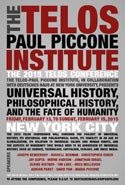 In his Critique of Judgment, Kant explains how “subjective judgments” resemble theoretical claims about truth in that they claim universal assent, even though they do not have an objective basis for doing so. In other words, although they are subjective, they assert a strict sense of objectivity and claim a universal ground for truth. Therefore, the proof of the validity of these judgments cannot be found in a specific “observable feature” of the object, but rather in the “actual intersubjective agreement.” While truth in his third Critique is neither a matter of the intellect nor a thing reducible to conceptual realm, it seems that he offers a different sense of truth that influenced the major trends in continental philosophy. One can trace this sense of truth as it provides a ground not only to “test the limits of our historical era” but also “to go beyond them.” In his Critique of Judgment, Kant explains how “subjective judgments” resemble theoretical claims about truth in that they claim universal assent, even though they do not have an objective basis for doing so. In other words, although they are subjective, they assert a strict sense of objectivity and claim a universal ground for truth. Therefore, the proof of the validity of these judgments cannot be found in a specific “observable feature” of the object, but rather in the “actual intersubjective agreement.” While truth in his third Critique is neither a matter of the intellect nor a thing reducible to conceptual realm, it seems that he offers a different sense of truth that influenced the major trends in continental philosophy. One can trace this sense of truth as it provides a ground not only to “test the limits of our historical era” but also “to go beyond them.”
Continue reading →
By Telos Press · Wednesday, October 22, 2014 In this video from the 2014 Telos in Europe Conference, Christopher Coker discusses why the idea of the West is an idea whose historical moment has come and gone, and how the collapse of the Western project is reflected in the crisis of liberal internationalism and the problems arising out of identity politics.
Continue reading →
By Robert Wyllie · Tuesday, October 22, 2013 As an occasional feature on TELOSscope, we highlight a past Telos article whose critical insights continue to illuminate our thinking and challenge our assumptions. Today, Robert Wyllie looks at Alain Manville’s “Hegel and Metaphysics,” from Telos 42 (Winter 1979).
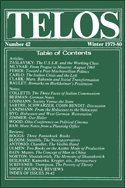 In “Hegel and Metaphysics,” Alain Manville joins the echelon of French theorists who attempt to focalize Hegelianism around one core concept. In the vanguard, Jean Wahl turned unhappy consciousness into an organizing principle for reading Hegel. More famously, Alexandre Kojève pared Hegelianism down to the core master-slave dialectic. Manville focuses upon the annihilation of metaphysics in Hegel’s speculative recognition that being equals nothingness. Speculative thought transcends the understanding (Vernunft), which sees only an ontological contradiction. Hegel dismisses Vernunft and metaphysics, Manville argues, to grasp concrete reality in a postmetaphysical sense. In “Hegel and Metaphysics,” Alain Manville joins the echelon of French theorists who attempt to focalize Hegelianism around one core concept. In the vanguard, Jean Wahl turned unhappy consciousness into an organizing principle for reading Hegel. More famously, Alexandre Kojève pared Hegelianism down to the core master-slave dialectic. Manville focuses upon the annihilation of metaphysics in Hegel’s speculative recognition that being equals nothingness. Speculative thought transcends the understanding (Vernunft), which sees only an ontological contradiction. Hegel dismisses Vernunft and metaphysics, Manville argues, to grasp concrete reality in a postmetaphysical sense.
Continue reading →
By Wesley Phillips · Tuesday, January 17, 2012 Wesley Phillips’s “Melancholy Science? German Idealism and Critical Theory Reconsidered” appears in Telos 157 (Winter 2011). Read the full version online at the TELOS Online website, or purchase a print copy of the issue here.
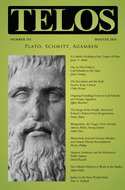 What is the relationship between theory and praxis today? During the 1960s, Adorno’s melancholy science was reproached with the charge of resignation, echoes of which have continued up to the present day—whether in Agamben or in praxis-oriented radical thought. In what is the most substantial critique to date, Gillian Rose initially sympathized with Adorno only to reject his neo-Kantian Marxism—the problem being that the melancholy science would involve a masochistically infinite task concerned with the recovery of an irretrievable utopia, leading to a methodological detachment from the social object. Understood in this way, the question of finite social praxis becomes an immanently philosophical matter. While following Rose’s orientation toward German idealism—for its imagined critique of neo-Kantianism and theory-ism—this article argues that, due to his unsatisfactory treatment of historical suffering, a return to Hegel alone (albeit after Marx) is insufficient. Rather, a dialectic of Hegel and his adversary Schelling suggests a distinctive account of determinate activity that avoids Melancholia without rejoicing the actuality of world spirit. This is made possible by way of an affinity between conceptions of melancholy and history in Schelling and Benjamin, from whom Adorno develops his traurige Wissenschaft. What is the relationship between theory and praxis today? During the 1960s, Adorno’s melancholy science was reproached with the charge of resignation, echoes of which have continued up to the present day—whether in Agamben or in praxis-oriented radical thought. In what is the most substantial critique to date, Gillian Rose initially sympathized with Adorno only to reject his neo-Kantian Marxism—the problem being that the melancholy science would involve a masochistically infinite task concerned with the recovery of an irretrievable utopia, leading to a methodological detachment from the social object. Understood in this way, the question of finite social praxis becomes an immanently philosophical matter. While following Rose’s orientation toward German idealism—for its imagined critique of neo-Kantianism and theory-ism—this article argues that, due to his unsatisfactory treatment of historical suffering, a return to Hegel alone (albeit after Marx) is insufficient. Rather, a dialectic of Hegel and his adversary Schelling suggests a distinctive account of determinate activity that avoids Melancholia without rejoicing the actuality of world spirit. This is made possible by way of an affinity between conceptions of melancholy and history in Schelling and Benjamin, from whom Adorno develops his traurige Wissenschaft.
Continue reading →
|
|
 Gillian Rose (1947–1995) had an influence in excess of her literary output and treatment in secondary literature. Author of eight books, two articles, and four book reviews, she also had important, though perhaps hidden, effects on the UK academic scene through academic friendship, doctoral supervision, and interdisciplinary work. She inspired many students and colleagues, even where she does not appear in bibliographies or citations. She made major contributions to introducing the Frankfurt School to the UK; aided the Hegel renaissance in English-language scholarship; and was an early critic of post-structuralism and political theology. Several of the papers gathered here were first given at a conference at Durham University on January 9, 2015, to mark the twentieth year since Rose’s death. That conference and this special issue of Telos are premised on the view that Rose’s work still has much philosophical insight and inspiration to offer. The authors of these papers were students, colleagues, and/or friends of Rose, or studied her work as part of their doctoral research. The diversity of their fields reflects some of the range and interdisciplinarity of Rose’s own work: Hegel, social theory, Marxism, politics, race, recognition theory, education, and theology. We hope that this issue provokes a renewed interest in what Rose can still offer us today.
Gillian Rose (1947–1995) had an influence in excess of her literary output and treatment in secondary literature. Author of eight books, two articles, and four book reviews, she also had important, though perhaps hidden, effects on the UK academic scene through academic friendship, doctoral supervision, and interdisciplinary work. She inspired many students and colleagues, even where she does not appear in bibliographies or citations. She made major contributions to introducing the Frankfurt School to the UK; aided the Hegel renaissance in English-language scholarship; and was an early critic of post-structuralism and political theology. Several of the papers gathered here were first given at a conference at Durham University on January 9, 2015, to mark the twentieth year since Rose’s death. That conference and this special issue of Telos are premised on the view that Rose’s work still has much philosophical insight and inspiration to offer. The authors of these papers were students, colleagues, and/or friends of Rose, or studied her work as part of their doctoral research. The diversity of their fields reflects some of the range and interdisciplinarity of Rose’s own work: Hegel, social theory, Marxism, politics, race, recognition theory, education, and theology. We hope that this issue provokes a renewed interest in what Rose can still offer us today.  Hegel’s lectures on the philosophy of history chart the development of free, reflective self-conscious selves, but what exactly does that mean? For skeptics, it doesn’t mean much, as Hegel notoriously appears to ground this development in the development of the state. This has inspired Popper’s well-known accusations that Hegel was a puppet of the Prussian monarchy, the “enemy of the open society,” etc., etc., and that the “free” subjects of the state as Hegel describes it are anything but. Further, from Marx to Habermas, Hegel is indicted as one who adopts a quietist attitude of priestly monasticism, so while those imbued with the proper critical, historical consciousness are busy trying to change the world according to the dictates of one or another praxis philosophy, Hegel is content to contemplate it as it goes up in flames. Habermas sees in Hegel’s mature work a “blunting of critique” and a “stoic retreat” from the problems of modernity, the very ones that Habermas believes the younger Hegel so incisively diagnosed.
Hegel’s lectures on the philosophy of history chart the development of free, reflective self-conscious selves, but what exactly does that mean? For skeptics, it doesn’t mean much, as Hegel notoriously appears to ground this development in the development of the state. This has inspired Popper’s well-known accusations that Hegel was a puppet of the Prussian monarchy, the “enemy of the open society,” etc., etc., and that the “free” subjects of the state as Hegel describes it are anything but. Further, from Marx to Habermas, Hegel is indicted as one who adopts a quietist attitude of priestly monasticism, so while those imbued with the proper critical, historical consciousness are busy trying to change the world according to the dictates of one or another praxis philosophy, Hegel is content to contemplate it as it goes up in flames. Habermas sees in Hegel’s mature work a “blunting of critique” and a “stoic retreat” from the problems of modernity, the very ones that Habermas believes the younger Hegel so incisively diagnosed.  In his Critique of Judgment, Kant explains how “subjective judgments” resemble theoretical claims about truth in that they claim universal assent, even though they do not have an objective basis for doing so. In other words, although they are subjective, they assert a strict sense of objectivity and claim a universal ground for truth. Therefore, the proof of the validity of these judgments cannot be found in a specific “observable feature” of the object, but rather in the “actual intersubjective agreement.” While truth in his third Critique is neither a matter of the intellect nor a thing reducible to conceptual realm, it seems that he offers a different sense of truth that influenced the major trends in continental philosophy. One can trace this sense of truth as it provides a ground not only to “test the limits of our historical era” but also “to go beyond them.”
In his Critique of Judgment, Kant explains how “subjective judgments” resemble theoretical claims about truth in that they claim universal assent, even though they do not have an objective basis for doing so. In other words, although they are subjective, they assert a strict sense of objectivity and claim a universal ground for truth. Therefore, the proof of the validity of these judgments cannot be found in a specific “observable feature” of the object, but rather in the “actual intersubjective agreement.” While truth in his third Critique is neither a matter of the intellect nor a thing reducible to conceptual realm, it seems that he offers a different sense of truth that influenced the major trends in continental philosophy. One can trace this sense of truth as it provides a ground not only to “test the limits of our historical era” but also “to go beyond them.”  In “Hegel and Metaphysics,” Alain Manville joins the echelon of French theorists who attempt to focalize Hegelianism around one core concept. In the vanguard, Jean Wahl turned unhappy consciousness into an organizing principle for reading Hegel. More famously, Alexandre Kojève pared Hegelianism down to the core master-slave dialectic. Manville focuses upon the annihilation of metaphysics in Hegel’s speculative recognition that being equals nothingness. Speculative thought transcends the understanding (Vernunft), which sees only an ontological contradiction. Hegel dismisses Vernunft and metaphysics, Manville argues, to grasp concrete reality in a postmetaphysical sense.
In “Hegel and Metaphysics,” Alain Manville joins the echelon of French theorists who attempt to focalize Hegelianism around one core concept. In the vanguard, Jean Wahl turned unhappy consciousness into an organizing principle for reading Hegel. More famously, Alexandre Kojève pared Hegelianism down to the core master-slave dialectic. Manville focuses upon the annihilation of metaphysics in Hegel’s speculative recognition that being equals nothingness. Speculative thought transcends the understanding (Vernunft), which sees only an ontological contradiction. Hegel dismisses Vernunft and metaphysics, Manville argues, to grasp concrete reality in a postmetaphysical sense.  What is the relationship between theory and praxis today? During the 1960s, Adorno’s melancholy science was reproached with the charge of resignation, echoes of which have continued up to the present day—whether in Agamben or in praxis-oriented radical thought. In what is the most substantial critique to date, Gillian Rose initially sympathized with Adorno only to reject his neo-Kantian Marxism—the problem being that the melancholy science would involve a masochistically infinite task concerned with the recovery of an irretrievable utopia, leading to a methodological detachment from the social object. Understood in this way, the question of finite social praxis becomes an immanently philosophical matter. While following Rose’s orientation toward German idealism—for its imagined critique of neo-Kantianism and theory-ism—this article argues that, due to his unsatisfactory treatment of historical suffering, a return to Hegel alone (albeit after Marx) is insufficient. Rather, a dialectic of Hegel and his adversary Schelling suggests a distinctive account of determinate activity that avoids Melancholia without rejoicing the actuality of world spirit. This is made possible by way of an affinity between conceptions of melancholy and history in Schelling and Benjamin, from whom Adorno develops his traurige Wissenschaft.
What is the relationship between theory and praxis today? During the 1960s, Adorno’s melancholy science was reproached with the charge of resignation, echoes of which have continued up to the present day—whether in Agamben or in praxis-oriented radical thought. In what is the most substantial critique to date, Gillian Rose initially sympathized with Adorno only to reject his neo-Kantian Marxism—the problem being that the melancholy science would involve a masochistically infinite task concerned with the recovery of an irretrievable utopia, leading to a methodological detachment from the social object. Understood in this way, the question of finite social praxis becomes an immanently philosophical matter. While following Rose’s orientation toward German idealism—for its imagined critique of neo-Kantianism and theory-ism—this article argues that, due to his unsatisfactory treatment of historical suffering, a return to Hegel alone (albeit after Marx) is insufficient. Rather, a dialectic of Hegel and his adversary Schelling suggests a distinctive account of determinate activity that avoids Melancholia without rejoicing the actuality of world spirit. This is made possible by way of an affinity between conceptions of melancholy and history in Schelling and Benjamin, from whom Adorno develops his traurige Wissenschaft. 

